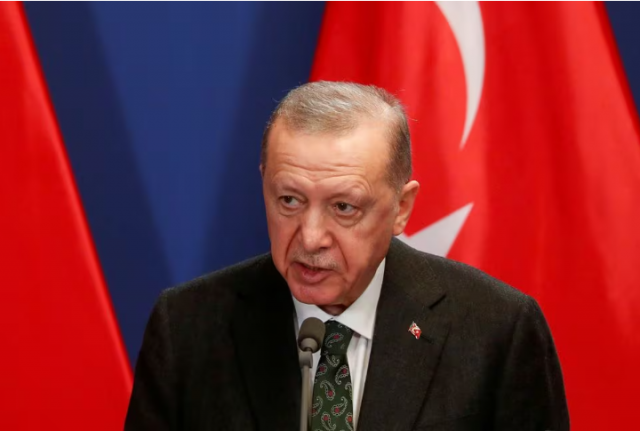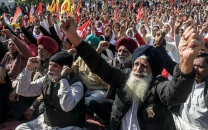Support for Erdogan remains key factor in Turkish public opinion: Pew survey
Pew survey shows a shift in public sentiment between Erdogan’s 2023 election win and 2024 defeat in local polls.

Support for Turkiye's President Recep Tayyip Erdogan remains a key factor in the Turkish public opinion on domestic and international topics alike, according to a recent survey by Pew Research Center that revealed an increase in negative opinions about the country's longtime leader.
The survey conducted between May 2023 and March 2024 also revealed that 55% of Turkish adults hold an unfavourable opinion of President Recep Tayyip Erdoğan, a marked decline since 2017. The results reveal a generally negative perception of Erdogan, with mixed opinions about the national government under his leadership.
1729338251-4/Untitled-design-(2)1729338251-4.png)
This survey, conducted with 1,049 respondents, indicates a significant shift in public sentiment following Erdoğan’s third presidential term election in May 2023 and his party's subsequent defeat in local elections.
The survey reveals that a majority of Turks—55%—now hold unfavorable views of Erdoğan, a stark contrast to the 43% who view him favorably.
This marks a 32 percentage point decline in positive opinions towards Erdoğan since 2017, which was just months after Erdoğan’s government survived a coup attempt.
Notably, the proportion of people expressing a "very favorable" opinion of Erdoğan has also dropped by 27 points, underscoring growing discontent among the electorate.
Public trust in Erdogan's administration appears to be waning across various domains.
Approximately 51% of respondents indicated a lack of confidence in the government to act in the national interest, while 53% doubted the fairness of the May 2023 elections.
Concerns are also prevalent regarding disaster preparedness, with 61% of Turks unsure if the government is capable of handling future natural disasters, especially in the wake of last year’s devastating earthquake.
1729338251-2/Untitled-design-(4)1729338251-2.png)
Source: Pew Research Center
Age and religiosity emerge as significant factors influencing public opinion. Older adults (50 and above) are generally more supportive of Erdoğan compared to younger adults (18 to 34).
Moreover, Turkish Muslims who engage in regular prayer tend to view the government and electoral processes more positively, demonstrating how personal beliefs intersect with political perspectives.
Despite widespread dissatisfaction—two-thirds of respondents are unhappy with how democracy functions in Turkey—most Turks still support democratic principles.
A striking 80% advocate for representative democracy, while 79% back direct democracy. Interestingly, 59% of respondents endorse technocracy, a government led by experts.
However, only 34% view a strong leader or military rule as viable options, with Erdoğan's supporters more inclined to favor such nondemocratic governance compared to their opponents.
1729338251-3/Untitled-design-(3)1729338251-3.png)
Source: Pew Research Center
Opinions on societal influences are mixed. While majorities view the police (78%) and military (62%) positively, only a minority see media, international corporations, or banks as beneficial.
1729338251-1/Untitled-design-(5)1729338251-1.png)
Source: Pew Research Center
Deep societal divides persist, particularly among political party supporters, and nearly half of Turkish Muslims identify significant tensions between different religious practices.
On the international stage, Turkish adults display mostly unfavorable opinions towards global powers. Approximately 80% express negative views of the United States, with similar sentiments directed at China and Russia.
1729338251-0/Untitled-design-(6)1729338251-0.png)
Source: Pew Research Center
However, attitudes toward NATO and the European Union are slightly more favourable; interest in EU membership remains strong, with 56% in support, reflecting a notable increase since 2019.
Erdogan has held power for over 20 years, reshaping Turkiye more than any leader since its founder, Mustafa Kemal Ataturk.



















COMMENTS
Comments are moderated and generally will be posted if they are on-topic and not abusive.
For more information, please see our Comments FAQ